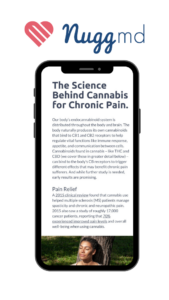Percocet is a prescription drug. It combines two ingredients: oxycodone, an opioid painkiller, and acetaminophen, a common pain reliever. It’s often used to treat moderate to severe pain. Like other opioids, it comes with serious risks if not used as directed.
Because of these risks, including the potential for addiction or overdose, some people have started looking into other options for relief, including cannabis. This has led to growing interest in whether the two can be used together safely.
Right now, there isn’t much research on how cannabis and Percocet interact. What we do know suggests there may be risks involved. This article looks at what science says so far. We explore why it’s important to talk to your doctor if you're considering using them together.

Find natural, lasting relief with our comprehensive (and completely free) patient’s guide to medical cannabis for chronic pain.
What is Percocet?
Percocet is an opioid, which is a drug class that comes from, or mimics, natural substances found in the opium poppy plant. Opioids work in the brain to produce a variety of effects, including pain relief.
Percocet is a serious medication that must be taken very carefully. It's very possible to become dependent on this medication, and it's also possible to develop a tolerance. Using opioids can severely impact someone's physical and mental health, so consider speaking with a medical professional about alternative options if you're curious.
Percocet is used to treat pain and is typically only prescribed when other pain relief options are not strong enough. Most medical professionals will prescribe another pain relief option before they turn to an opioid prescription.
Opioid addiction is a serious health problem. Addiction to opioids is fairly common and can be avoided by avoiding opioids or only taking them carefully under the instruction of a licensed medical professional.
Percocet can have serious side effects. Common side effects include:
- Stomach pain
- Nausea
- Headache
- Dizziness
- Fever
- Yellow eyes
- Loss of appetite
Opioid prescriptions are widespread, with doctors in the U.S. giving out 43.3 prescriptions per 100 people. If you've been given an opioid prescription, it's extremely important only to take it as prescribed and never take a higher dose than prescribed or more often than prescribed.
Cannabis and Percocet: What the Latest Research Says

There’s limited research exploring how cannabis and Percocet interact. While some studies have explored how cannabis may interact with opioids more broadly, results are still early and inconclusive.
Some animal and human studies suggest that THC may enhance the effects of opioids like oxycodone. This has led researchers to explore whether cannabis might influence how much of an opioid a person needs. However, these findings are preliminary and don’t yet offer clear guidance for medical use. More research is needed before any conclusions can be drawn.
While some small studies have looked at potential benefits, others have raised concerns. For example, combining cannabis with opioids may increase drowsiness, dizziness, and cognitive changes. This risk increases in higher doses. Some researchers have also noted a potential link between combining the two and higher reports of anxiety or depression in some individuals. In most cases, the effects vary based on dose, tolerance, and individual health factors.
One 2023 study found that cannabis did not worsen respiratory depression caused by oxycodone, a serious and potentially life-threatening side effect of opioids.1 But this doesn’t mean the combination is safe, especially without medical oversight. The risk of addiction and overdose from opioids remains high, and it’s important never to adjust your dose or add other substances without speaking to your doctor first.
Because of the dangers linked to opioids, researchers are studying whether cannabis could play a role in reducing opioid use. In a 2020 review involving over 7,000 people, some patients reported reducing or even stopping opioid use altogether. However, these findings are self-reported. Further controlled studies are needed to confirm their significance.
While some are curious about whether cannabis could serve as an alternative to medications like Percocet, this is a decision to be made with a licensed healthcare provider. What works for one person may not work for another; safety should always be the top priority.
Are You Considering Using Cannabis and Percocet?
Combining cannabis with any substance or medication carries its own risks. Cannabis research is still in its earliest stages, and there is a lot that researchers still don't know. That leaves the door open for unexpected interactions with other substances. If you are considering combining cannabis with any other substance or medication, speak to your doctor for proper medical guidance.
Likewise, stopping the use of a prescribed medication can lead to unintended consequences. Many medications take time to build up in the body. Stopping suddenly can cause unpleasant and potentially serious or even fatal side effects. If you'd like to stop using or replace a medication, you need to follow the guidance of your medical provider to make any approved adjustments safely.

Find natural, lasting relief with our comprehensive (and completely free) patient’s guide to medical cannabis for chronic pain.
References
- van Dam CJ, van der Schrier R, van Velzen M, et al. Inhaled Δ9-tetrahydrocannabinol does not enhance oxycodone-induced respiratory depression: randomised controlled trial in healthy volunteers. Br J Anaesth. 2023;130(4):485-493. doi:10.1016/j.bja.2022.12.018
↩︎
The information in this article and any included images or charts are for educational purposes only. This information is neither a substitute for, nor does it replace, professional legal advice or medical advice, diagnosis, or treatment. If you have any concerns or questions about laws, regulations, or your health, you should always consult with an attorney, physician or other licensed professional.




